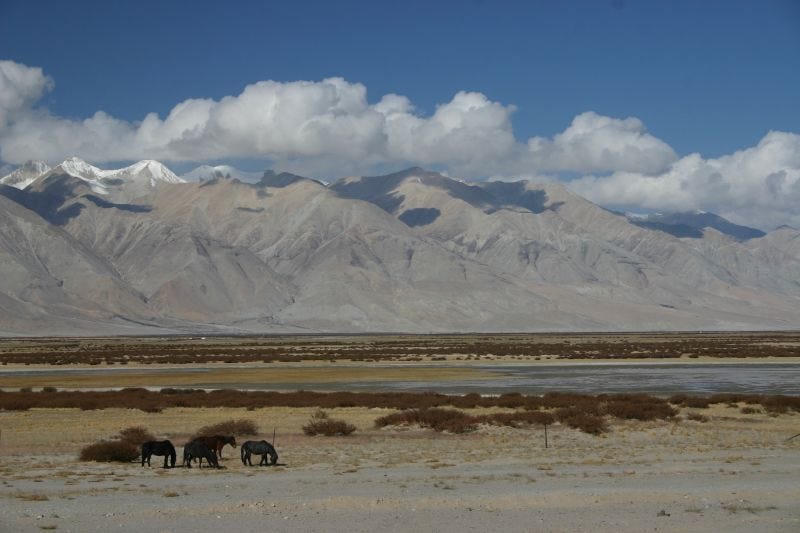What caught my eye - April/May 2025
London's resilience is meh, water worries in South Asia, and more from the emergency situational awareness app boom

If you’re been in London the past week, you would have noticed the unseasonably warm weather! As we are getting closer to London Climate Action Week in June, and we are likely to be in the hottest year (again!) on record, there’s no better time to talk about the so-what of keeping ourselves alive and thriving in a changing world.
**Possible meet-up opportunity!**
If you are planning to be in London during LCAW (21-29 June), I would like to set up an informal gathering that week of awesome people like yourselves engaged at the intersection of climate, security, geopolitics, and resilience. Please message me by commenting on this post or via LinkedIn if you’re interested and we’ll have a soiree if there’s a critical mass!
And now, onto the links!
🇮🇳 🇵🇰 💧South Asia and water are very much in the news this week!
Escalating tensions between India and Pakistan over a terrorist attack in Kashmir, for which India blames Pakistan-backed militants, has led to Delhi suspending its participation in the Indus Water Treaty and progress on new dams along the main rivers feeding into it. While the withdrawal is at the moment more symbolic than material - water data sharing was spotty at best and it will take years for new dams to come online (India could argue this is OK since it has stepped out of the treaty), while India can do nothing really to prevent Pakistan from its share of monsoon rains - it is a potent example of states’ readiness to weaponise water within a conflict.
Snowpack in the Himalayas are at a over-two decade low, per a new study. Twelve major river basins - including the Mekong and Salween - supply water to 2 billion people, and snowpack deficits compared with historical averages mean over time less runoff in the late spring which enhances water stress by early summer. With China controlling the headwaters of key rivers like the Brahmaputra, the water security picture has long been complex, and worth factoring in conflict risk scenarios for those thinking about medium-term geopolitical risks in South and Southeast Asia.
📝 Looking for an opportunity to get involved? The UK Climate Emergencies Forum is having an open call for organisations to propose a wide range of solutions and strategies to build the future of climate emergency response. Register your interest by 18 May. Read here to learn more.
🤷♂️ The Innovation Zero conference is happening this week in London, and Gautier Houel at The Green Londoner had a nice recap of day 1 proceedings, where a panel involving Emma Howard Boyd who chairs the London Climate Resilience Review teased a preview of the review’s 2025 edition. Gautier mentions while there were nods to tree planting and home insulation, previous years’ commitments - such as an innovation challenge - were not mentioned which does not give great confidence to how ambitious the 2025 review will be. Watch this space but maybe don’t hold our breaths just yet?
🤷🏽♀️ The Climate Change Committee of the UK also published a progress report this week on the state of play of climate adaptation and resilience. It’s worth reading the report (or using ChatGPT to help you out) but the tl;dr - the UK government still has done little to materially improve the major gaps across goal setting, strategy, cross-coordination, integration into existing policies, monitoring and evaluation, and funding. Basically, everything. It is worth noting the study suggests that failure to act can dent the UK’s GDP by up to 7% by 2050, creating a serious drag on sustained long-term economic growth. These will have deleterious effects across the economy and society, including the government’s capacity to invest to defend itself from human and natural threats.
🚒 Another fire / heat-tech startup, this time it’s California-based Watch Duty building real-time wildfire alerts supporting firefighters and emergency responders. The startup’s app pools in intel from open source (social media) and inputs from clients (fire departments), curating the data for quality and timeliness, to provide a one-pane dashboard for firefighters. Because so much of the business model relies on first responders as a source of input as well as being customers, trust relationships are paramount to the tool’s success - something those of us in the private sector security world are well attuned to. They’re also planning to build a wiki of disaster preparedness - will be fascinating to see how they grow as a nonprofit.
💩 DoD “climate change crap”: US secretary of defense Pete Hegseth has unsurprisingly de-emphasised the role and impact of climate change on military force readiness. Read more on Axios.
I’m off to enjoy the sun. Back at you in a couple of weeks!



